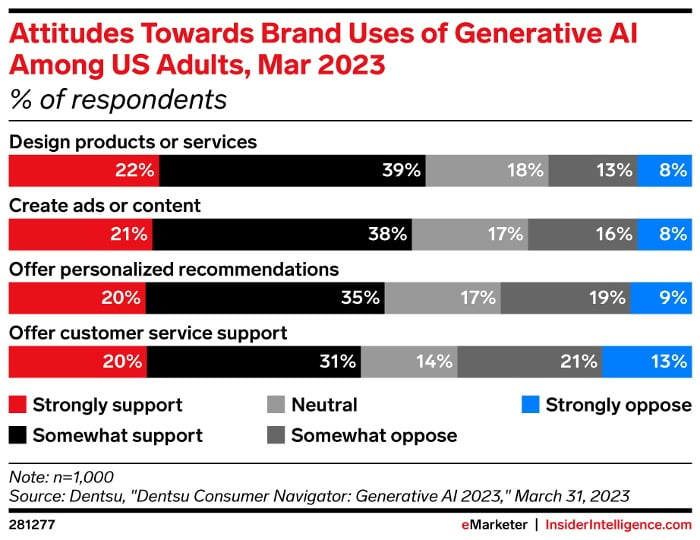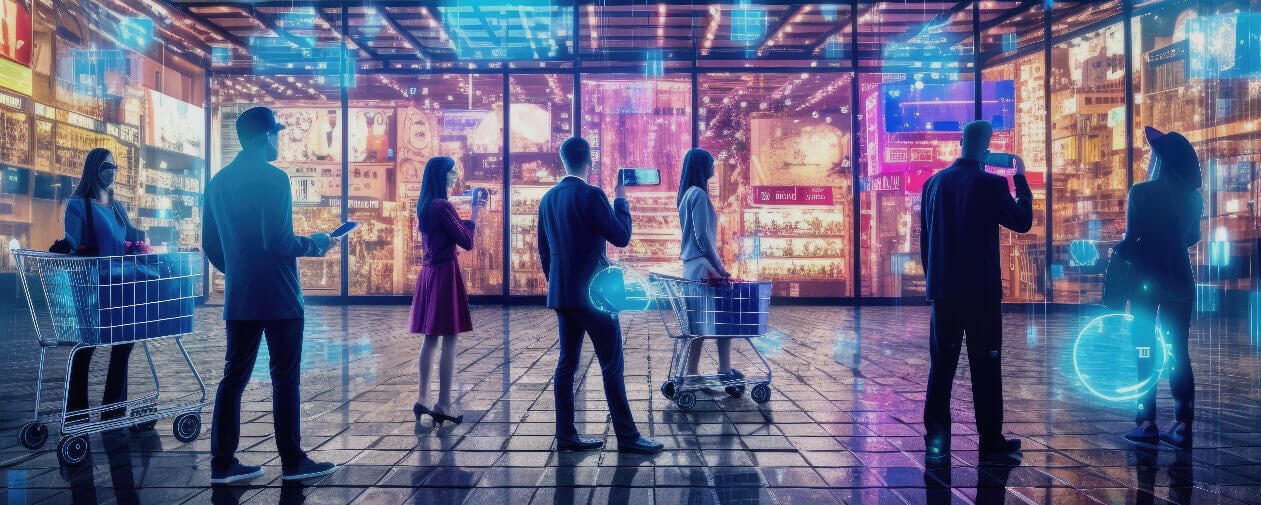If you’re a retailer or a retail brand and you don’t have a ready answer to this question—or worse, are befuddled by the question—your customers are way ahead of you.
A recent study found that 76% of consumers understand that artificial intelligence in retail is being used to help them shop online, with 42% having used a chatbot or virtual assistant to make a purchase. AI’s ability to automate tasks can reduce costs and improve efficiency in many areas of retailing, from customer service to sales, from advertising to operations. And it’s driving innovation inside stores.
The capabilities of AI in the retail industry are evolving day by day, and retail AI is rapidly becoming critical to increasing product margins and revenues. In fact, according to a Fortune study, “The global artificial intelligence in retail market size was valued at $5.50 billion in 2022 and is projected to grow from $7.14 billion in 2023 to $55.53 billion by 2030.”
Retailers and brands that delay jumping into the AI fray and making it an essential component of a sustainable profitability strategy are missing out on meeting customer expectations and reaping a huge competitive advantage. Here are some realities to keep in mind as you build or evolve your AI strategy.
Ready to learn more about retail AI and other solutions that will give you a competitive advantage? We can help!
The Transformative Power of Artificial Intelligence in the Retail Industry
Most researchers agree that AI has the potential to transform businesses in ways we have yet to fully comprehend or imagine. At its most basic level, AI can automate processes and routine tasks, creating fully autonomous, end-to-end workflows. The resulting human displacement lets retail employees put more emphasis on other activities, such as “handling and packing inventory, and addressing more complex customer needs, resulting in increased business productivity and higher CSAT [Customer Satisfaction Survey] scores,” according to MyTotalRetail.
In a recent Forbes article, the author says, “For retailers, this is a once-in-a-generation opportunity. Embedded into the enterprise digital core, generative AI will transform their ability to optimize tasks, manage data, create faster insights, innovate with new experiences, augment front-line workers, and connect and communicate with customers.”
There are two types of AI generative and general. The latter refers to broad systems of human-like intelligence, whereas generative AI goes a step further, using machine learning to examine data and discover patterns as a basis for generating new content.

Source: eMarketer | InsiderIntelligence.com
More specifically, generative AI in retail is set to make great strides in retail operations, inventory and supply chain management, marketing, and more. A recent Forbes article outlined how retailers can leverage generative AI in retail stores. We summarized the findings and those from other sources below.
AI in Retail Stores: 8 Use Cases
Give Shoppers Personalized Product Recommendations
AI tools can curate custom journeys. Based on historical data and previous purchases and relying on predictive analytics, this might include suggesting products relevant to those previously browsed and offering personalized discounts for those products. This encourages purchases and notches up the customer experience.
Provide Cashier-less Technology
Self-service, contactless purchasing for in-store shoppers has risen in popularity since the pandemic. More advanced AI systems with automatic scanning technology allow shoppers to fill their carts with goods, have them instantaneously and automatically charged to their account, and simply take them home.
Analyze Customer Sentiment
Reputation management has become all-important for brands, as consumers share their brand and shopping experiences with the public through social media. AI technologies can analyze customer sentiment by monitoring social media accounts and reviewing social posts and online reviews. Then, the data derived can allow retailers and brands to quickly respond to and resolve complaints.
Manage Inventory Levels
Generative AI can streamline inventory management and help make informed ordering and manufacturing decisions that optimize supply chain and delivery. In fact, McKinsey & Company reports that AI-powered supply-chain forecasting can reduce errors by up to 50% and reduce lost sales and product unavailability by up to 65%. For instance, out-of-stocks can be avoided with intelligent fulfillment centers integrated with AI-driven supply chain systems. When human error is reduced, retailers can experience greater accuracy in monitoring order volume, shipping logistics, and inventory levels, and use the data to meet product stock demands.
Optimize Product Pages and Promotional Messages
A retailer’s e-commerce aisles shouldn’t merely list brands and product information. Product pages should be optimized to be accurate, complete, and inclusive of top-ranked keywords and relevant images. In kind, email and text messages should be consistent with product page information and emphasize value to each customer. Generative AI can simplify this process. It can also select discounts and coupons that will resonate with individual customers.
Monitor and Optimize Prices
With some 95% of shoppers going online to compare prices of similar products during in-store shopping trips, retailers should consider tracking competitors’ price movements in real time to avoid losing sales. AI can analyze competitor prices, demand patterns, and market trends to help optimize pricing structures.
Train and Upskill Retail Associates
Labor shortages can result in a reduction in necessary retail staff and an urgent need to rapidly train new hires. AI chatbots, according to Bain research, can provide helpful prompts and instructions that assist staff in doing their jobs better.
Detect and Prevent Fraud
Generative AI in retail uses algorithms that can detect and prevent fake purchases and returns and identify counterfeit products and unauthorized sellers in the marketplace. By reducing cyber threats, retailers can take confidence in an elevated level of security and protect both their brand identity and their margins.
Hyper-Personalization, Here We Come!
A heightened level of individualized engagement with customers depends on gathering a great amount of detail about their shopping habits, purchase history, demographics, and communication preferences. AI can collect and assess this information and recommend products relevant to past purchasing patterns and even recommend products similar to those left in an abandoned shopping cart.
AI can also detect when a customer is using an in-store retail app and alert virtual brand experts to contact the customer via text or email so that they can offer assistance to the customer in discovering and learning about various products.
Hyper-Personalization, Here We Come!
A heightened level of individualized engagement with customers depends on gathering a great amount of detail about their shopping habits, purchase history, demographics, and communication preferences. AI can collect and assess this information and recommend products relevant to past purchasing patterns and even recommend products similar to those left in an abandoned shopping cart.
AI can also detect when a customer is using an in-store retail app and alert virtual brand experts to contact the customer via text or email so that they can offer assistance to the customer in discovering and learning about various products.
A study by Precedence Research projects the global AI retail market to reach nearly $46 billion by 2032.
The Retail AI Imperative
Whether retailers are looking forward to it or are skeptical of it, AI is already transforming shopping experiences. It has the capacity to improve personalization, provide a more customized shopping experience, and increase operational efficiencies in many ways that have yet to be explored.
Still, there are financial, technical, and other challenges that hinder implementing artificial intelligence at scale. This may require, according to the author of a recent LinkedIn article, a team of data scientists with proficiency in multiple domains of expertise and strong business acumen. Investments should focus on building a holistic data strategy. Those who have made early investments in building one can tap into technological advances across the business.
The risks are greater for retailers who don’t embrace AI now. If your tech stack is outdated… if you have been waiting to modernize your operations… or if your data strategy isn’t up to par… the time is ripe to begin implementing retail artificial intelligence. Ultimately, artificial intelligence in retail can lead to higher profits, increased efficiency, and a better customer experience.
Ready to talk?
Ready to learn more about retail AI and other solutions that will give you a competitive advantage? We can help!


